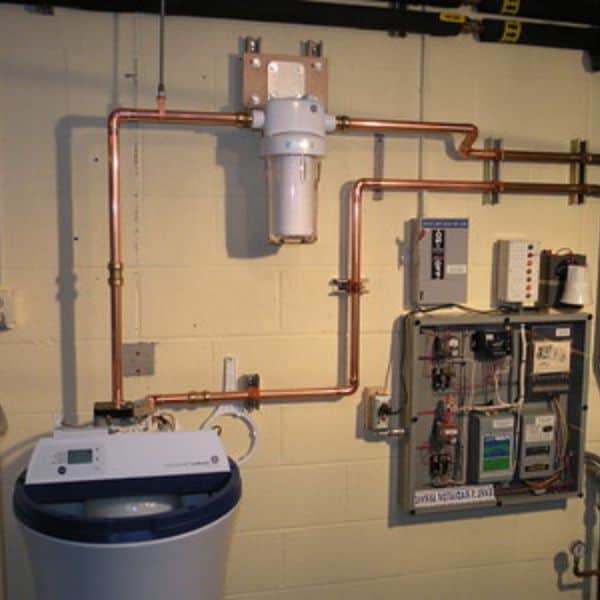What is a Whole House Water Filter?
A whole house water filter is an effective and efficient way to protect your family from contaminants in your water supply. It fits onto the main water line of your home, removing impurities such as chlorine, fluorine, and other chemicals that can be unhealthy for you and your family.
The system works by utilizing a series of filters designed to remove sediment, rust, pesticides, and other microorganisms from the water before it enters your home. These systems provide a superior level of protection against the numerous issues that may arise from drinking tap water. Plus they offer complete peace of mind knowing that the water you are consuming and showering in is safe and healthy for your entire family!
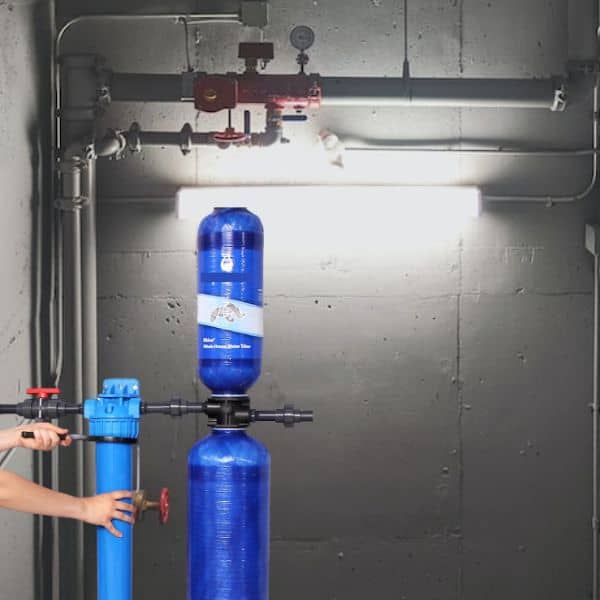
Different Types Of Whole Water Filtration Systems:
If you need a filter, there are various types of whole house water filtration systems to consider:
Sediment Filters
Whole house sediment filters are highly useful for anyone who wants to reduce their exposure to contaminants that can exist in tap water. They are designed to remove sediments, dirt, sand, and rust particles from the water coming into your home. The use of whole house sediment filters can definitely have a positive impact on the quality of your drinking water.
How Do They Work?
The working principle behind most whole house sediment filters is relatively simple: as pressure forces the water through a medium such as activated carbon or mesh fibers, debris becomes trapped in the medium, and clean water flows out of the other side. It’s important to understand that, while this type of filter removes particulate impurities only, it cannot reduce chemical contamination or eliminate bacteria and viruses. That said, if you want cleaner water without spending a lot to install an additional filtration system, a whole house sediment filter may be an economical option worth considering.
Carbon Filters
Whole house carbon filters are a great way to keep your home’s air clean and fresh. These filters help remove contaminants from the air, such as dust, pollen, viruses, and gases. The filter is usually made of activated carbon, a porous material that can absorb impurities as air passes through it. The filter is then housed in an appropriate holder which may contain one or more different kinds of carbon filters.
In addition to these benefits, these filters also aid in reducing allergic reactions in individuals who are sensitive to environmental allergens like dust and pollen. To maintain its effectiveness over time, it should be replaced regularly so that new activated carbon particles become available for capturing additional airborne impurities.
How Do They Work?
Carbon filters work by passing water through activated carbon which is dense and has a high surface area, making it absorbent and effective in trapping contaminants that can be found in drinking water. They help to remove chlorine and sediments, improve taste and smell, reduce particulates and optimize overall water quality.
The system provides clean, fresh-smelling water throughout the entire home without having to resort to costly bottled water options or other methods that can be inconvenient. With a whole house carbon filter, you’ll have peace of mind knowing that all of your drinking, showering, and cooking needs are taken care of with crystal clear, contaminant-free H2O!
Reverse Osmosis Systems
Reverse Osmosis (RO) is a top whole house water filter. It is an amazing solution to provide safe, clean water throughout an entire home. Unlike other filtering systems, these systems filter out a wider variety of contaminants, making them ideal for households in areas with greater contamination or uncertain sources of water such as those that get their water from wells.
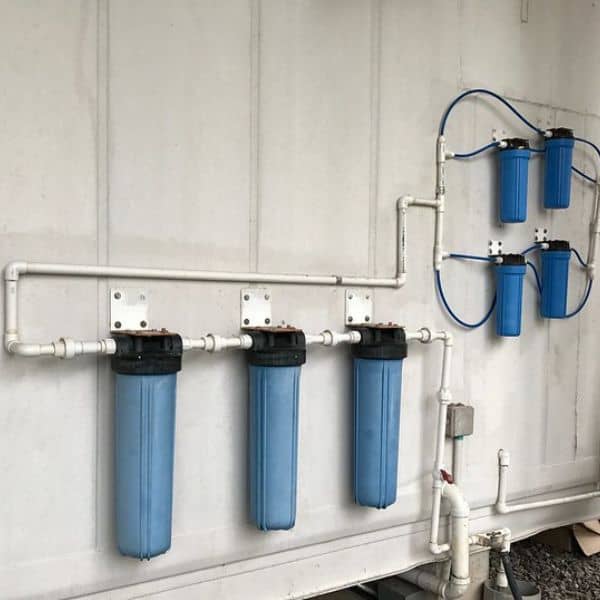
How Do They Work?
Reverse osmosis systems slowly treat the water as it passes through a semi-permeable membrane where bacteria, salt, and other contaminants are safely removed while minerals essential to health are left behind. From there, the filtered water passes through several purification cartridges that remove things like chlorine and lead. The result is better-tasting and healthier drinking water directly from your tap! Plus you have peace of mind knowing the whole house has clean drinking water for everyone in your family.
UV Filter Systems
Whole house UV water filter systems are designed to clean water coming into a home from the main municipal line. This helps to ensure that all the water being used in your home for drinking, cooking, and cleaning is free from contaminants and safe for use. The system uses ultraviolet light to target and eliminate bacteria or microorganisms as the water passes through it on its way into your home.
While this type of filtering will not be able to eliminate all potentially harmful substances, it has been proven to be effective in diminishing bacteria levels significantly. Additionally, since it does not require any type of chemicals or maintenance other than periodic replacement of the UV bulb which typically lasts anywhere between one and two years, it is an economical choice for those looking to protect their family from contaminated tap water.
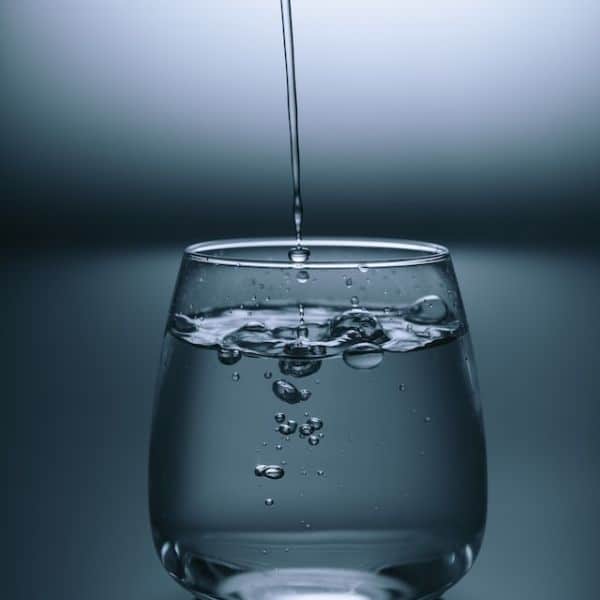
How Do They Work?
These systems work by using ultraviolet light to target and kill off microorganisms, such as protozoa, bacteria, and viruses, that can be found in the water. In order for this process to be effective, it is important that the light has time to interact and attach itself with the DNA or protein of each microorganism.
That is why most units include a stainless steel chamber within their construction. This chamber works as a storage tank for the water during treatment, so that the UV light can remain in contact with it for an extended period of time.
Depending on their usage, these systems will typically require bulb replacements every 6-12 months in order for them to remain effective. Investing in one of these filtration systems offers peace of mind when it comes to ensuring your family has clean and safe drinking water each day!
Whole House Water Filters Vs Countertop Filters:
When it comes to making sure you and your family have clean, safe, and delicious water for drinking and other purposes, there are a few options to choose from.
Countertop Filters
While countertop or under-sink filters are great choices for smaller households that don’t use much-filtered water throughout their day-to-day activities, they may not work as well in bigger households with higher water usage needs.
Whole House Water Filters
Whole house water filters offer an excellent choice in these circumstances — they filter all the water coming into your home at the point of entry, meaning every tap in your house has access to clean, filtered water.
Not only that, but these systems also require far less maintenance than countertop or under-sink models as they last longer and need fewer system replacements over time.
If you’re looking to filter all incoming water into your home and make sure everyone in your household has access to safe and delicious drinking or cooking water, then a whole house filter might be exactly what you need!
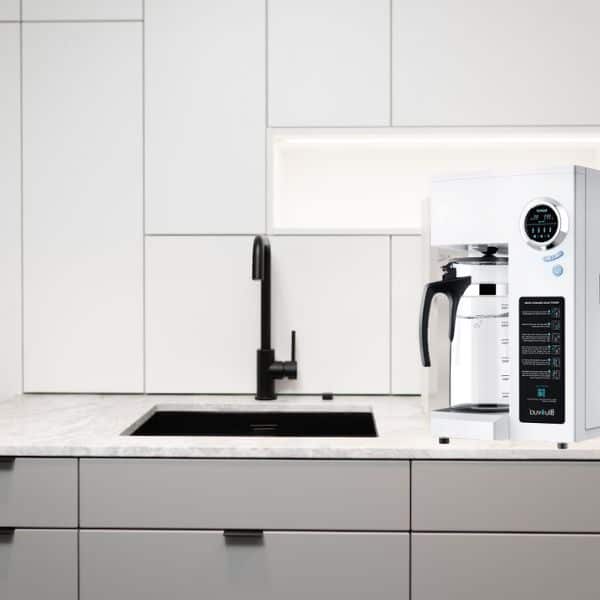
Advantages & Disadvantages Of Whole House Water Filter Systems:
Advantages
- Installing a whole house water filter system is a great investment for any homeowner.
- Not only will it last for many years, but it comes with a variety of health and environmental benefits.
- These systems help to filter contaminants from the municipal water supply, delivering clean, pure water to every tap in your home.
- Whole house water filters have been found to improve indoor air quality and provide tastier drinking water by removing chlorine and bacteria.
- They can also reduce exhaustion symptoms caused by aquatic toxins like lead or even pharmaceuticals in the drinking water.
- Additionally, these systems are incredibly effective when it comes to separating larger particles like rust that can stain clothing and damage appliances.
- Plus, they require very little maintenance, so you can rest assured that you’ll continue to enjoy fresh, clean water for years to come!
Disadvantages
Whole house water filter systems can do a lot to make your home’s water safer and cleaner, but there are some potential drawbacks.
- For example, the cost of a whole house water filter system is often greater than for a single-point filter or several smaller filters throughout the house.
- Additionally, some systems require professional installation and regular maintenance, making them more complicated to maintain than smaller, single-point filtration units.
- While most whole house water filter systems do an effective job of removing larger sediment chunks, it is important to check that they are certified to remove specific contaminants like microbes and VOCs (volatile organic compounds).
Ultimately though, the long-term benefits of having clean drinking water throughout your home can far outweigh the drawbacks.
Why You Need a Whole House Water Filtration System?
Having access to clean and safe drinking water is essential for any family — it’s not a luxury, but a necessity! Investing in a whole house water filtration system ensures that all of the water coming into your home is filtered, removing contaminants like chlorine, lead, and other heavy metals. Cleaner-smelling and tasting water can improve the overall health of your family and make sure that everyone has access to clean water for drinking and other activities. Additionally, a whole house filter will greatly reduce debris in the water, which can extend the life of plumbing fixtures, clothes washers, and dishwashers.
Which Type Of Filter Is Better For You?
There are many types of filtration systems that may be better for you. If you just need to filter the water in one part of your home, such as the kitchen or bathroom sinks, then a countertop or faucet-mounted filter might be an ideal solution.
However, if you want to filter all of the incoming water into your home, then a whole house filtration system is the way to go.
Conclusion
A whole house water filter system is an investment for any homeowner looking to provide the cleanest and safest drinking water for their family. By filtering out contaminants from the municipal water supply, these systems are able to improve indoor air quality, reduce exhaustion symptoms caused by aquatic toxins, and eliminate larger particle debris that can damage appliances or clothing.
Although installation and maintenance can be costly, the long-term benefits of having clean drinking water throughout your home make it a worthwhile investment.
